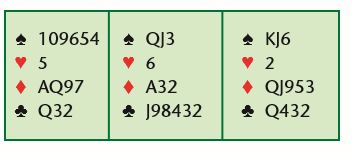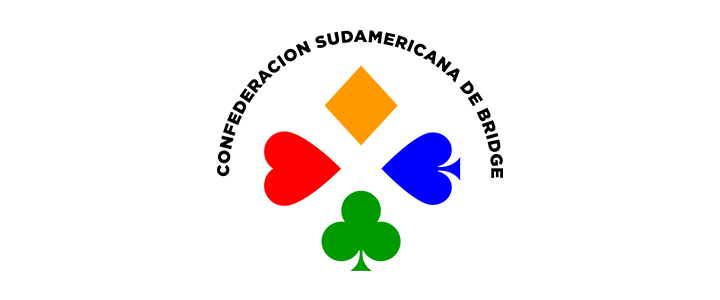
Source: Traps for the Unwary, Protective Bidding Part I
Why do so many experienced players play more hands than their less experienced counterparts? And why do they always seem to defend 3![]() going down when everyone else has played in 2
going down when everyone else has played in 2![]() making?
making?
The answer is protection – the art of coming to the party later and making a big entrance; big enough to win you the bidding war. Protective bidding is the name given to bidding in the pass-out seat -that is to say, choosing after two passes whether or not you want to defend on a deal, or bid and try and play the contract.
Auctions like these all leave North in the protective seat:

Your first reaction might be: ‘Why would North consider bidding on the second round if he couldn’t bid on the first round?’ The logic is simple once you know partner has some values it is much safer to bid. Consider the first auction and give North some sample hands:
On Hand 1 you correct passed 1![]() lacking the values and the sit for a one level overcall. You might think it would be madness to bid at the two level, but 2
lacking the values and the sit for a one level overcall. You might think it would be madness to bid at the two level, but 2![]() is the call you should make. Think about values – West has failed to try for game so is limited to 15 points, and might have as few as 11. East has just made a feeble raise of clubs showing at most 9, and is far more likely to have 6 or 7. On average the opponents will have about 20 points between them, so partner is marked with an opening hand. He won’t have more than two clubs, so he should have some spade support, because had he held ten red cards he would surely have overcalled. There is always the danger ‘Won’t my partner think I have more points if I bid at the two level?’ but the answer is no! -remember, partner has seen you pass 1
is the call you should make. Think about values – West has failed to try for game so is limited to 15 points, and might have as few as 11. East has just made a feeble raise of clubs showing at most 9, and is far more likely to have 6 or 7. On average the opponents will have about 20 points between them, so partner is marked with an opening hand. He won’t have more than two clubs, so he should have some spade support, because had he held ten red cards he would surely have overcalled. There is always the danger ‘Won’t my partner think I have more points if I bid at the two level?’ but the answer is no! -remember, partner has seen you pass 1![]() , so he knows you won’t have 8 points and a good live-card suit.
, so he knows you won’t have 8 points and a good live-card suit.
Hand 2 is similar: your failure to bid on the first round gives you protection on the second. Partner will know you couldn’t bid earlier, so if you make a take-out double now you can ask partner to choose a suit and help him compete to the two or three level. You have support for all three of the suits, whatever partner wants to try will be fine. (If you find partner with the dreaded 3-3-3-4 shape with four dubs, then he will just bid his best three-card suit and a 4-3 fit will play fine at the two level.)
Hand 3 is even more comfortable bidding 2![]() , as you have six cards in the suit; even if partner only has a doubleton, you will have a fit. The advantage in not bidding the first time is seen as partner will not over-compete when the opponents bid 3
, as you have six cards in the suit; even if partner only has a doubleton, you will have a fit. The advantage in not bidding the first time is seen as partner will not over-compete when the opponents bid 3![]() : he will know that you are effectively bidding his hand as well when you bid 2
: he will know that you are effectively bidding his hand as well when you bid 2![]() .
.
Often you make a protective bid in order to protect partner’s good hand who couldn’t bid on the first round because of his length in the opponent’s suit. Have a look at auction 2) again and consider a few example hands:

 It might seem tempting to make an overcall claiming that partner will know you have a poor hand as you have passed originally, but double is a better choice in each case Partner obviously has some values, as most of the time the opening bidder will have 11-20 (average of 13-14) and the responder will have 0-4 (average 2-3). If partner has an opening hand, then why did he not bid earlier? The answer is that he has length in the opener’s suit and may be waiting to pass your re opening double for penalties. If he has a chunky A.Q- 10.8-5 and a 14-count sitting over the opening bidder-then a juicy penalty will be coming your way.
It might seem tempting to make an overcall claiming that partner will know you have a poor hand as you have passed originally, but double is a better choice in each case Partner obviously has some values, as most of the time the opening bidder will have 11-20 (average of 13-14) and the responder will have 0-4 (average 2-3). If partner has an opening hand, then why did he not bid earlier? The answer is that he has length in the opener’s suit and may be waiting to pass your re opening double for penalties. If he has a chunky A.Q- 10.8-5 and a 14-count sitting over the opening bidder-then a juicy penalty will be coming your way.
We will continue looking at protective bidding next time, but let’s review some of the dos and don’ts of protective bidding.
[box style=”rounded” border=”full”]
Do:
• Make sure you aggressively protect when the opponents stop at a low level and you can deduce partner has some values.
• Rely on partner to work out that your failure to bid on the first round means you weren’t worth a bid then, not that you forgot!
• Continue to make disciplined passes on the first round, knowing that you can always bid later if the opponents stop low, and that you won’t want to bid later if the opponents have game values.
[/box]
[box style=”rounded” border=”full”]
Don’t:
• Think that because you pass on the first round you must pass through-out.
• Rush in with an overcall if a double is better; partner may be stacked in their suit and waiting to pass.
[/box]



